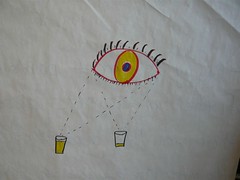Reforming Ideas
Reflections on and chronicles of a summer professional development course on Antebellum Reform movements for secondary teachers.
Monday, November 8, 2010
Wednesday, October 13, 2010
Thursday, August 12, 2010
Day One: Religious Roots of Reform
- "Religion is neither inherently moral or immoral."
- Bronson Alcott was a vegetarian, but didn't let his family eat root vegetables because he believed they grew toward the devil."
- Henry David THUH-ro whipped six boys on the day before he resigned his post as school teacher in Concord.
 |
| "Historical Debate and Controversy" |
 |
| John Stauffer's Lecture on the Religious Roots of Reform |
 |
| Despite appearances, "We live as we dream--alone." |
Wednesday, August 11, 2010
Day 2: Women's Rights, Reform Movement Stations, and Technology
Women's Rights, or, as we learned the antebellum refomists called it, the Woman Rights movement, was the topical theme for today. Our visiting scholar, Laurie Crumpacker, joined the rest of the day's workshops and the scholars by presenting with technology. She used lots of visuals in her presentation, but also supplied a handout with primary source excerpts. Although the part of the lecture that I heard was interesting and certainly helped me make some new connections about material that is in the standard U.S. I or U.S. History curriculum, the packet of documents is the piece that would help make sure that some of my own new knowledge was transferred to students. (I also noticed that what has stuck most in my mind are questions about Elizabeth Cady Stanton's marriage and the Beecher/Tilton scandal--and in connection with yesterday's post, I have to adjust my thinking--there is something to be said for the power of good gossip to intrigue and engage. I'm certainly planning to do some follow-up reading to get "the rest of the story.")
I've always valued primary sources for their richness and power in getting students talking, but I got a glimpse of them today as a kind of plumb line--providing a straight line into the deeper waters of history and--this is a pretty powerful plumb line--also as a conduit for the kind of discussions that reside in those dynamic waters. Dean Crumpacker disagreed with Steve Mintz a few times, and although her references were brief, I got the sense that she really enjoyed it. I felt like we had a chance to catch a glimpse into a bit of "historical debate and controversy" in action--and also that she seemed to enjoy it in good spirit.
What if we included in the frameworks or thinking benchmarks showing that thinking can be fun, and that to be scholar brings with it membership in a community of thinkers who, through work that they direct and have the deepest sense of ownership of, are in constant conversation with each other as well as with the figures of the past.
I've always valued primary sources for their richness and power in getting students talking, but I got a glimpse of them today as a kind of plumb line--providing a straight line into the deeper waters of history and--this is a pretty powerful plumb line--also as a conduit for the kind of discussions that reside in those dynamic waters. Dean Crumpacker disagreed with Steve Mintz a few times, and although her references were brief, I got the sense that she really enjoyed it. I felt like we had a chance to catch a glimpse into a bit of "historical debate and controversy" in action--and also that she seemed to enjoy it in good spirit.
What if we included in the frameworks or thinking benchmarks showing that thinking can be fun, and that to be scholar brings with it membership in a community of thinkers who, through work that they direct and have the deepest sense of ownership of, are in constant conversation with each other as well as with the figures of the past.
Subscribe to:
Posts (Atom)